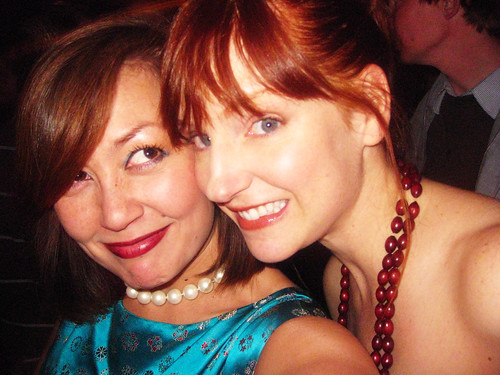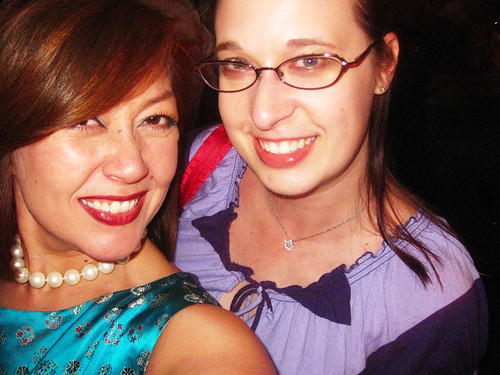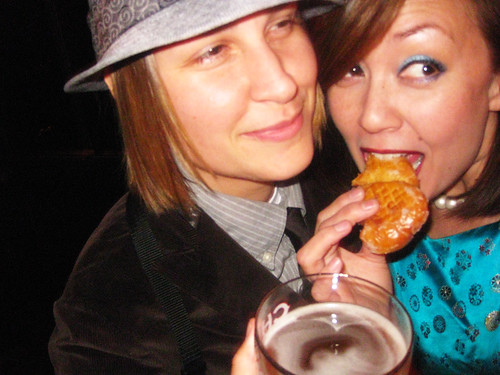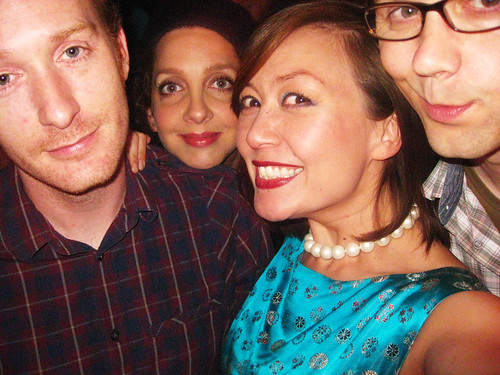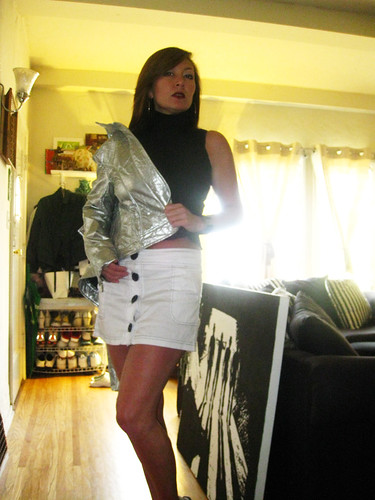I began writing this post on May 18, 2010. It was just a couple of song lyrics I never got around to explaining. But here's the story.
In 2010, my birthday fell on a Friday. I gathered my friends at the Seven Grand for an evening of making this face.
Also this face.
Also this face.
And of course this one.
And this one.
I had fun that night. Even when we had to drive all around Downtown trying to find the forgotten spot where Jessie had parked her car. I had fun even though the weeks leading up to that night had been filled with confusion and consternation. And the night before had been filled with being broken up with by phone over a problem that wasn't actually the problem. In such cases, the problem at issue is seldom the actual problem. Even then, I knew that. Instinctively. Anyway, that night, I put all of that out of my head and had my birthday, because it was my birthday and fuck all that other nonsense. And I was wearing that vintage dress I had bought at Shake Rag, and Beulah even had fun running the pool table for a while.
The rest of that weekend, Beulah stuck around and kept me company. We went to see Iron Man 2. We went to some of our favorite places. One of which is Happy Six in West L.A. And while we were shopping for the cute there, I heard an Owl City song for the first time. And even though it sounded kind of stupid and poppy, there was a line that stuck out to me and made me want to sit by myself somewhere where no one would see how ashamed I was of being sad over the stupid loss of something that never was.
I spend my coldest nights alone, awake and thinking of the weekend we were in love.
Later that summer, I put that song on a mixtape. That day, I bought a silver jacket. Here is a picture of half of it.
I took this picture on another day that ended in sadness and shame. This time involving a meet-up at Swingers that should never have happened. I did get my Breaking Bad DVDs back that night, though. So.
Around that time, I came across a Psapp song that also ended up on a mixtape, on account of this:
Don't make me a chapter. I want to be the whole of your book.
And then I heard Orange Shirt by Discovery, and it was these lyrics that mattered:
Sleep on the train to Tokyo. Google yourself when you get home.
All this love that you're keeping. And me I've got a crush.
I put that song on a mixtape, too. Jessie was in my car when we were driving to the City Attorney's office the week after my birthday to deal with other nonsense, and when it started playing, she said, "What's this?" And it sounded like what she meant to say was, "What the fuck is this?" But I don't know. I sometimes think some of my friends think I'm so square, they don't believe it if I mention any singer outside of Fred Waring.
And then there's the Gomez song that came about as close to being one of those "this is our song" songs as it could have. And then there's that Yeah Yeah Yeahs song. The playlist is long. And now that playlists are no longer limited by the amount of tape on the spools, I just append and append. The songs keep getting written. And the lyrics keep making me want to make ill-advised phone calls and just play songs into people's voice mails in a very postmodern-Say Anything kind of way. There's that Shiny Toy Guns song. And that Salem Al Fakir song. And that Manchester Orchestra/Grouplove song that Beulah got me hooked on. There are all of these songs that I really like but prefer to skip when they come up in the mix. Because it's all well and good to feel something, but I'd like to be just a tiny bit in control, please, okay?
Anyway, if I can admit to once having my heart broken by an Owl City lyric, well, there's a lot more you can do is all I'm saying. On our deathbeds, we will curse the many things we were ruled by. I guarantee it.
It's very, very late in New York City, where I am sitting up very, very awake in my hotel room, allowing this old iPod to play playlists from years ago. If you need an explanation, that is why.
Secret Pop
Sep 22, 2013
Sep 15, 2013
The Remembering Self
I learn a lot when I'm driving.
I was driving back from Beulah's house a couple of weeks ago and I caught an episode of the TED Radio Hour about memory. There was one segment in particular that poked at me with special persistence. It was the segment featuring Daniel Kahneman called "How Do Experiences Become Memories?" The idea is -- and I'm paraphrasing here -- that a wonderful experience can be ruined if it ends badly, because the way things end is more significant or more intrinsically valuable when we form our personal stories. Because our memories of our experiences are more meaningful than the experiences themselves, and also because if something ends badly, it's more important to remember that fact than to traipse down memory lane, lingering on the parts of the experience that were idyllic. If idyllic ends in shit, it's the shit that counts.
It was posited that this is part of a species survival mechanism. That we have limited space in our brains, so nature wires us to remember the important takeaways -- and if something was terrible, it's important that we remember that fact so that we can protect ourselves from that same terribleness in the future. By the same token, if something painful ends in joy, the joy is the part that sticks. Take childbirth. Women often say you forget the pain. Labor ends in the arrival of a wonderful little gift, so that's the part of the experience the brain places in the time capsule. This certainly makes strategic sense in terms of survival of the species, because if women always remembered the pain, it's far more likely they wouldn't sign up for it again.
I am blessed and cursed with a very good memory. It seems my brain works the way that is most effective in forming memories in that I visualize everything. I remember the way things looked. I remember the weather. I remember what I wore. But it's fair to say that I also -- pretty much without fail -- remember how things ended. And usually in painful detail. And the problem with that is that that pain is very portable, and I take it with me wherever I go.
I have allowed a lot of experiences to be ruled by the memories of their failings and their endings, and I have experienced a lot of endings that ruined the experiences that preceded them. I guess there was some comfort in hearing that this is the way the human brain works and not some sabotaging tactic of my cruel inner self. But still.
The biggest problem with this process is the statistical reality that, if you live long enough, the majority of your brain space might be occupied by memories of unpleasant things that, by design, eclipse any of the pleasantness that may have surrounded them. Growing older is so much more complex and nuanced than Aspercreme commercials would have you believe.
I used to live in my memories. They were my fuel. An often bitter, poisonous fuel. Sometimes, I am actually nostalgic for times when I was living in the melancholy throes of nostalgia. I treasured memories of sadness because they were so much more powerful than any other kind. Now, that's a snake eating it's own horrible tail. For instance, I used to listen to a cassette we bought when these two guys from Canada came to sing at our church. And I remember the night that we saw them perform, one of the women in our church passed away. They announced it at the end of the concert. And my 4th grade heart went out to her two young children, who had come over to swim in our pool while their mom was in hospital. And every time I listened to that cassette, I would remember feeling sad that night and feeling my heart going out, and it was a feeling I went back to again and again.
But this is more about the parts we remember than it is about my specific habit of forcing myself to relive pain. And thinking about what we remember and what it means and how it shapes what we do next happened to be especially relevant to me the day I heard the piece. As it continues to be.
The TED Radio Hour piece I referenced can be found here: http://www.npr.org/2013/05/09/182667116/memory-games
I was driving back from Beulah's house a couple of weeks ago and I caught an episode of the TED Radio Hour about memory. There was one segment in particular that poked at me with special persistence. It was the segment featuring Daniel Kahneman called "How Do Experiences Become Memories?" The idea is -- and I'm paraphrasing here -- that a wonderful experience can be ruined if it ends badly, because the way things end is more significant or more intrinsically valuable when we form our personal stories. Because our memories of our experiences are more meaningful than the experiences themselves, and also because if something ends badly, it's more important to remember that fact than to traipse down memory lane, lingering on the parts of the experience that were idyllic. If idyllic ends in shit, it's the shit that counts.
It was posited that this is part of a species survival mechanism. That we have limited space in our brains, so nature wires us to remember the important takeaways -- and if something was terrible, it's important that we remember that fact so that we can protect ourselves from that same terribleness in the future. By the same token, if something painful ends in joy, the joy is the part that sticks. Take childbirth. Women often say you forget the pain. Labor ends in the arrival of a wonderful little gift, so that's the part of the experience the brain places in the time capsule. This certainly makes strategic sense in terms of survival of the species, because if women always remembered the pain, it's far more likely they wouldn't sign up for it again.
I am blessed and cursed with a very good memory. It seems my brain works the way that is most effective in forming memories in that I visualize everything. I remember the way things looked. I remember the weather. I remember what I wore. But it's fair to say that I also -- pretty much without fail -- remember how things ended. And usually in painful detail. And the problem with that is that that pain is very portable, and I take it with me wherever I go.
I have allowed a lot of experiences to be ruled by the memories of their failings and their endings, and I have experienced a lot of endings that ruined the experiences that preceded them. I guess there was some comfort in hearing that this is the way the human brain works and not some sabotaging tactic of my cruel inner self. But still.
The biggest problem with this process is the statistical reality that, if you live long enough, the majority of your brain space might be occupied by memories of unpleasant things that, by design, eclipse any of the pleasantness that may have surrounded them. Growing older is so much more complex and nuanced than Aspercreme commercials would have you believe.
I used to live in my memories. They were my fuel. An often bitter, poisonous fuel. Sometimes, I am actually nostalgic for times when I was living in the melancholy throes of nostalgia. I treasured memories of sadness because they were so much more powerful than any other kind. Now, that's a snake eating it's own horrible tail. For instance, I used to listen to a cassette we bought when these two guys from Canada came to sing at our church. And I remember the night that we saw them perform, one of the women in our church passed away. They announced it at the end of the concert. And my 4th grade heart went out to her two young children, who had come over to swim in our pool while their mom was in hospital. And every time I listened to that cassette, I would remember feeling sad that night and feeling my heart going out, and it was a feeling I went back to again and again.
But this is more about the parts we remember than it is about my specific habit of forcing myself to relive pain. And thinking about what we remember and what it means and how it shapes what we do next happened to be especially relevant to me the day I heard the piece. As it continues to be.
The TED Radio Hour piece I referenced can be found here: http://www.npr.org/2013/05/09/182667116/memory-games
Subscribe to:
Comments (Atom)
